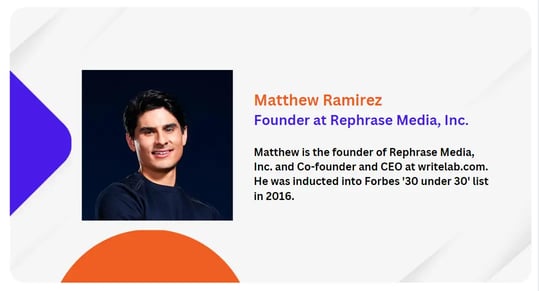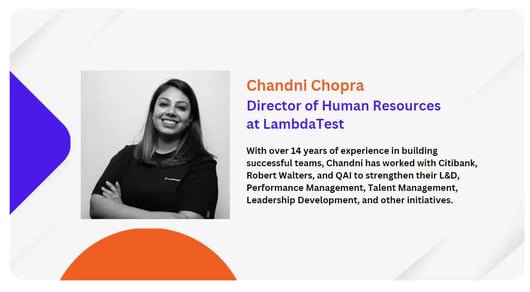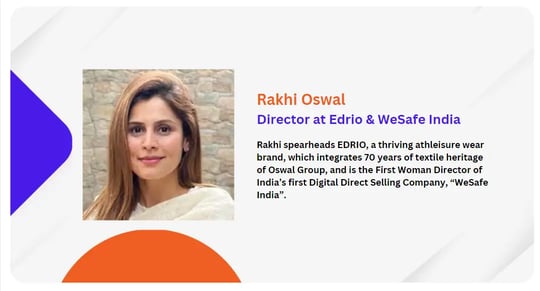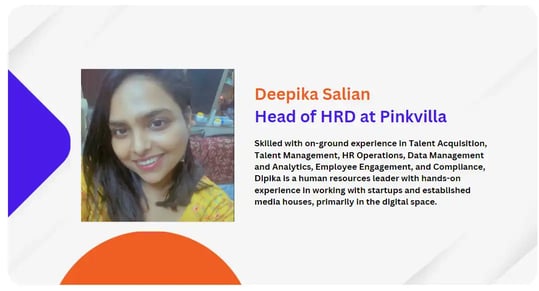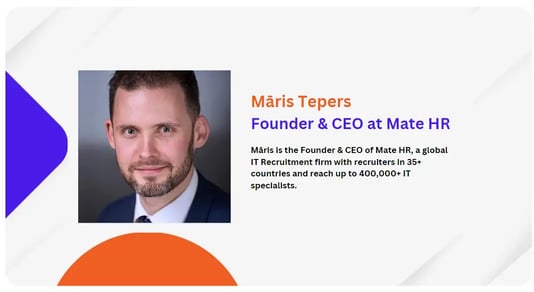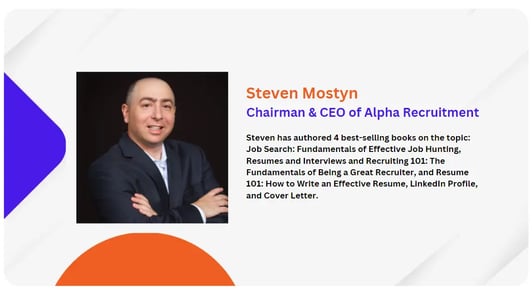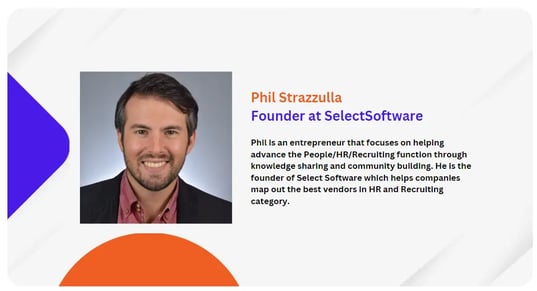As speculations go, AI is meant to take over most of our menial and repetitive tasks in the future. But can the same be said about Talent Acquisition?
Talent Acquisition (or TA) as a process comprises many sub-tasks that are repetitive but still require specific skill sets to ensure their fruitful conclusion. Additionally, most organizations have fixed TA budgets that need to be considered before integrating new technologies into the mix.
This is why, at iMocha, we sat down with global leaders to shed some light on these concerns and understand how AI can actually revolutionize Talent Acquisition in the coming future.
Here is what we found!
1. Jonathan H. Westover, Managing Partner & Principal at Human Capital Innovations
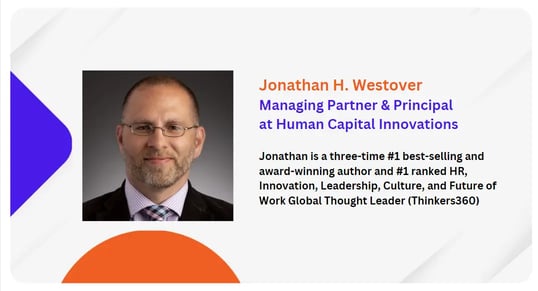
How do you think the increased use of AI will affect talent acquisition, and which acquisition aspect will reap the most benefits from AI?
The increased use of AI in talent acquisition will likely have a significant impact on the recruitment process, particularly in areas such as candidate screening and sourcing. AI-powered tools can help identify strong matches for job openings based on skills, experience, and other relevant factors, which can save recruiters time and improve the quality of hires. Additionally, AI can help identify potential candidates who may not have previously been considered, leading to a more diverse candidate pool. The aspect of talent acquisition that will likely reap the most benefits from AI is automating repetitive and time-consuming tasks, allowing recruiters to focus on more strategic work, such as building relationships with candidates and creating a positive candidate experience.
Would you trust AI with hard-to-measure metrics like employee experience, well-being, inclusion, etc.?
While AI can be useful for measuring certain aspects of employee experience, well-being, and inclusion, I believe it is important to use AI in conjunction with human judgment and expertise. Hard-to-measure metrics often require a more nuanced and contextual understanding that can only be gained through human interaction and interpretation. AI can be a useful tool for gathering and analyzing data, but it should not be relied upon to make decisions without human input.
With technological advances, do you expect the talent acquisition budget to increase or decrease in the future?
With technological advances, I believe that the talent acquisition budget will likely increase in the future as organizations invest in new tools and technology to improve their recruitment processes. However, it is important to note that technology alone cannot solve all recruitment challenges and that a balanced approach that incorporates both technology and human expertise is necessary for success. Organizations will need to prioritize investments in technology that align with their overall talent strategy and support their recruitment goals.
2. Mathew Ramirez, Forbes ‘30 Under 30’ & Founder at Rephrase Media, Inc.
How do you think the increased use of AI will affect talent acquisition, and which acquisition aspect will reap the most benefits from AI?
With the increased use of AI, we’re seeing sourcing and screening processes speed up immensely. For example, it’s now possible to source and screen thousands of candidates in under 24 hours—that’s a feat that would have been unheard of even a few years ago.
With more efficient processes comes more time for the actual recruiting to happen. With AI screening out the unqualified candidates and speeding up the process for the ones that meet the requirements, recruiters can spend more time on interviews, assessing cultural fit, and other aspects of the recruitment process that are much more challenging to automate.
Would you trust AI with hard-to-measure metrics like employee experience, well-being, inclusion, etc.?
AI is one of the best ways the industry can get accurate and objective data on employee experience and well-being. Companies have for too long relied on outdated, impersonal, and biased HR practices and surveys. AI is thorough and doesn’t treat employees differently based on diversity factors like race, gender, or age. It’s time to stop fighting change and embrace AI as a way to measure and track employee experience and well-being.
With technological advances, do you expect the talent acquisition budget to increase or decrease in the future?
Talent acquisition has always been an expensive process. However, in this age of AI and machine learning, we are seeing a new breed of technology emerge that helps us find the best candidates faster and with a much smaller budget. In the future, with these new TA tools, we will be able to find the talent we are looking for with a fraction of the budget we used to spend. While the initial outlay for these tools may be expensive, we will see an immediate return on our investment. This is especially true with the cost of sourcing passive candidates.
3. Chandni Chopra, Director - Human Resources, LambdaTest
How do you think the increased use of AI will affect talent acquisition, and which acquisition aspect will reap the most benefits from AI?
The increased use of AI in talent acquisition is likely to have a significant impact on the industry. AI can automate many of the repetitive and time-consuming tasks associated with talent acquisition, such as resume screening, scheduling interviews, and conducting initial candidate assessments. This will free up recruiters’ time to focus on higher-value activities such as building relationships with candidates and developing employer branding. As for which acquisition aspect will reap the most benefits from AI, it will likely be in the area of candidate sourcing and screening. AI-powered tools can help identify potential candidates from a wider pool of talent, match job requirements with candidate skills and qualifications, and even predict which candidates are more likely to accept a job offer.
Would you trust AI with hard-to-measure metrics like employee experience, well-being, inclusion, etc.?
Trusting AI with hard-to-measure metrics like employee experience, well-being, and inclusion will require careful consideration. While AI can process large amounts of data and identify patterns that may be difficult for humans to detect, it cannot replace the human touch and empathy needed to understand and address these issues. Therefore, AI should be used as a complementary tool rather than a substitute for human judgment. For example, AI-powered surveys and sentiment analysis can provide insights into employee experience and well-being, but it is up to human HR professionals to interpret the results and take action.
With technological advances, do you expect the talent acquisition budget to increase or decrease in the future?
Technological advances are likely to have a mixed impact on the talent acquisition budget. On one hand, AI can automate many tasks and reduce the need for manual labor, which can lead to cost savings. On the other hand, implementing AI-powered tools and systems requires significant upfront investment in terms of software, hardware, and training. Therefore, the overall impact on the budget will depend on the specific technology solutions chosen and the organization’s ability to use them effectively. However, it is reasonable to expect that the talent acquisition budget will shift towards investing in technology and data-driven solutions in the coming years.
4. Chelsea Ashbrook, Senior Manager-Corporate Digital Experience at Genentech
How do you think the increased use of AI will affect talent acquisition, and which acquisition aspect will reap the most benefits from AI?
The surging adoption of AI in talent acquisition will be nothing short of revolutionary. Recruitment processes will make identifying top-notch candidates feel like a walk in the park. With precision and efficiency, businesses will soar to new heights in finding the perfect match for their needs. Say hello to the future of talent acquisition, where AI takes the wheel and leaves no stone unturned in the quest for the ideal candidate. The aspect of talent acquisition that will provide the most benefits from AI is candidate screening. This tool will save time and resources, allowing recruiters to focus on building relationships and making better-informed decisions.
Would you trust AI with hard-to-measure metrics like employee experience, well-being, inclusion, etc.?
Drawing from my experience using AI tools in content creation, I understand the importance of balancing automation with human intuition. I would be hesitant to rely solely on AI when it comes to hard-to-measure metrics like employee experience, well-being, and inclusion. AI can support these aspects by providing insights and data analysis, but ultimately, humans should make the final decisions, ensuring the unique intricacies of human experiences are appropriately addressed.
With technological advances, do you expect the talent acquisition budget to increase or decrease in the future?
As for the talent acquisition budget, technological advances will initially lead to increased budget allocation for implementing and developing AI systems. However, once these systems are in place and functioning efficiently, the overall budget could decrease over time. AI-powered solutions help streamline and optimize recruitment, saving time and money.
 5. Rakhi Oswal, Director at Edrio & WeSafe India
5. Rakhi Oswal, Director at Edrio & WeSafe India
How do you think the increased use of AI will affect talent acquisition, and which acquisition aspect will reap the most benefits from AI?
I believe that the increased use of AI in talent acquisition will have a significant impact on the efficiency and effectiveness of the process. AI can help automate repetitive tasks, such as resume screening, and provide more objective and data-driven insights into candidate selection. I think the aspect of candidate matching and sourcing will reap the most benefits from AI, as it can help identify and attract qualified candidates that may have otherwise been missed.
Would you trust AI with hard-to-measure metrics like employee experience, well-being, inclusion, etc.?
While AI can provide valuable insights into hard-to-measure metrics like employee experience, well-being, and inclusion, it should not be solely relied upon. Human judgment and empathy are still essential in understanding and addressing these complex issues. However, AI can certainly supplement human efforts and provide data-driven insights that can inform decision-making and drive positive change.
6. Prankit Chaturvedi, Senior Global Talent Acquisition Specialist at Turing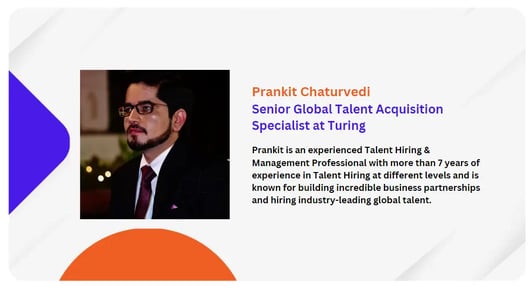
How do you think the increased use of AI will affect talent acquisition, and which acquisition aspect will reap the most benefits from AI?
AI will definitely benefit in 2 TA aspects: Sourcing and Vetting.
Today, many job portals such as CareerBuilder, Dice, Monster, and LinkedIn already use AI-enabled recommendation models to source suitable candidates based on past filters and keywords. And in the coming future, more organizations will integrate such capabilities into their own hiring processes. On the other hand, for technical vetting, AI will be very useful as we’ll be able to train the system to capture suitable parameters during the system or architecture design.
Would you trust AI with hard-to-measure metrics like employee experience, well-being, inclusion, etc.?
At least for now, my answer will be ‘NO’.
What works for one person may not work for another. Every person is different and needs to be dealt with differently. So metrics like employee experience and well-being should be handled by a human as we can interact one on one and identify what’s working and what’s not. Sadly, AI models today can’t be trained to understand human emotions; however, in the future, it may, we don’t know!
With technological advances, do you expect the talent acquisition budget to increase or decrease in the future?
TA budget is supposed to increase as we still do not have a stable system in place and we are still experimenting with AI models. Once we establish an AI-friendly system, we will be able to develop many tools that can use the true potential of AI, and then that might lower the cost of AI integration and the overall TA budget.
7. Vishal Madan, Head of Engineering at iMocha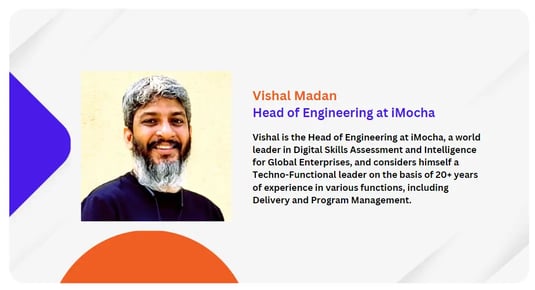
How will AI Impact Talent Acquisition?
To understand the right impact of AI on Talent Acquisition, we first need to understand that Talent Acquisition is not Recruitment, which focuses on filling current positions, but it's more strategic in nature, and recruitment is just one part of it. AI has been impacting Talent Acquisition, but what's new this year is Generative AI, and hence let's talk specifically about the impact of Generative AI on this function. Generative AI can be used for creating content for Strong Employer Branding, be it on the company website's career page, Applicant Tracking Systems, Social Media Pages & posts, and, let's say, employee referral emails. It can be further used to better understand skills required for a particular job role and thus create perfectly articulated Job Descriptions. Post-Offer stage and pre-onboarding, Generative AI can be used to keep the offered candidates engaged with the right company updates. The AI-based assistance in Resume Parsing and Scoring, matching applications to positions, background check and assessments, and predicting offer acceptance and joining will continue with higher accuracy.
Would you trust AI with hard-to-measure metrics like employee experience, well-being, inclusion, etc.?
Yes, definitely. However, we all need to understand that every AI-based system has limitations, and the decision-making process should be built around these limitations. Though not too technical, we need to be aware of accuracy, precision, and recall, which are some key attributes of any AI-based system, and the complete usability of the system in the required use case depends on these values. We need to confirm further whether the systems that are delivering these metrics respect the principles of AI. I have spoken more about this in my LinkedIn article.
With technological advances, do you expect the talent acquisition budget to increase or decrease in the future?
The use of AI comes with a lot of experimentation and trials, and we could end up spending a budget on the use of the wrong technology or the right technology being misused. Successful adoption of the right tool might take time. In addition, there would be a budget needed for the configuration of the tools, which would include making the systems learn and further training of the end-users. Post the successful adoption, the costs due to inefficient or inadequate sourcing, time taken for matching applications to positions, offer dropouts, etc., would decrease, and hence the budget as well.
8. David Bitton, Co-Founder & CMO at DoorLoop
How do you think the increased use of AI will affect talent acquisition, and which acquisition aspect will reap the most benefits from AI?
The biggest concern with AI right now is that it could exacerbate hiring prejudice. The quality of the data the AI was trained on will ultimately determine how successfully it conducts objective talent acquisition. Since AI may rely on data with unintentionally biased selection sequences and pull data that has been trained on insufficient and frequently skewed data sets, it may encourage biased hiring.
Would you trust AI with hard-to-measure metrics like employee experience, well-being, inclusion, etc.?
I don't think using AI as the gold standard for gauging employee satisfaction, and inclusivity is an intelligent idea. Great attention should be taken while making decisions that affect people's lives and careers. The issue with AI is that it cannot think for itself and will always follow its programming. AI can easily be trained with inaccurate and incomplete data, which may cause more problems than it can solve. Hence the requirement for human intervention in the process.
9. Kashif Aftab, Founder & CEO at SkillGigs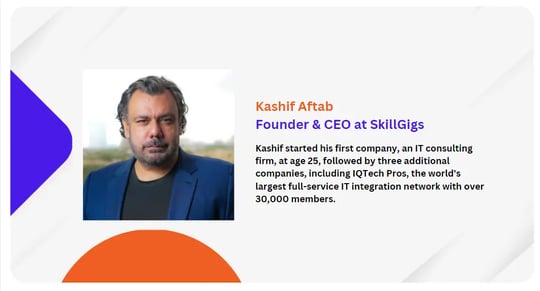
How do you think the increased use of AI will affect talent acquisition, and which acquisition aspect will reap the most benefits from AI?
I think AI has a multitude of benefits for the talent acquisition process. The biggest boon will be eliminating subjectivity from the hiring process. But to get down to the nuts and bolts of it, I see the most benefit in three major buckets:
- Sourcing: The right AI partner helps employers do this by presenting a more accurate picture of the skills needed for a job, which helps them write better job descriptions and get matched with candidates they might have erroneously screened out otherwise.
- Interviewing: AI in resume screening helps you find qualified candidates, conduct candidate assessments, and accelerate the hiring cycle. It can help you gather data on employees in similar roles and prepare the right questions for hiring managers.
- Onboarding: AI-powered recruitment solutions offer digital assistants like chatbots who can communicate with newly hired employees and ensure that they complete their tasks. They also provide guidance on what to do next and help employees quickly get the answers they are looking for without scouring various documents or web pages that take up valuable work time.
Would you trust AI with hard-to-measure metrics like employee experience, well-being, inclusion, etc.?
Yes. As long as the questions being asked in a survey are honest, clear, and thoughtfully designed, this can be a major boon for your company. AI thrives on feedback, meaning the more employees engage with the platform, asking them these questions, the more accurate your metrics are likely to be.
With technological advances, do you expect the talent acquisition budget to increase or decrease in the future?
I expect that more investment will be made in AI talent acquisition tools and platforms, particularly talent marketplaces. The reason: AI helps eliminate the subjectivity that can lead to bad hiring decisions (i.e., paying more attention to an employee's "culture fit" or where they went to school than their actual, hard skills and qualifications). Relying solely on subjective human judgment when sourcing, interviewing, and onboarding new employees is costly. But AI-powered recruitment solutions can help reduce subjectivity and help you find the right talent match the first time by removing unconscious bias from every step of the process and helping you implement truly fair hiring practices.
10. Jessica Smith, Founder, CEO & Principal Recruiter at Savant Recruitment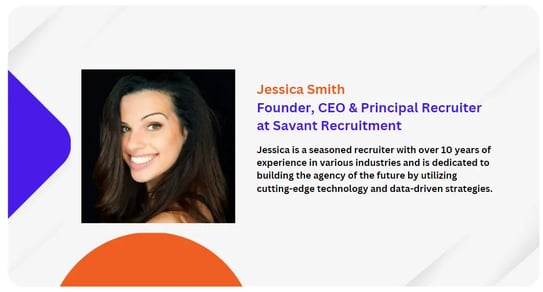
How do you think the increased use of AI will affect talent acquisition, and which acquisition aspect will reap the most benefits from AI?
If you're not using AI at this point in your Talent Acquisition process, especially when it comes to writing copy and campaigns, especially the AIPRM extension on ChatGPT, you are sorely missing out. There is a very human element to what we do as recruiters, and this is a very relationship-based industry. There's a lot that AI won't replace, but when it comes to writing your copy, this is where it's at.
Would you trust AI with hard-to-measure metrics like employee experience, well-being, inclusion, etc.?
It depends on how the AI collects data. As a business owner, one of your main goals should be making data-driven decisions but also understanding how that data is collected. It would be interesting to see a tool break down the data so that we could see the information in real-time and create predictions of what this means so that we could further drive the success of the talent acquisition efforts and departments. Especially when it comes to influencing stakeholders in the organization.
With technological advances, do you expect the talent acquisition budget to increase or decrease in the future?
For the companies and leadership teams that understand that they are hemorrhaging money and talent by doing absolutely nothing right now, yes, I expect the budgets to increase. For companies that do not care, and see talent acquisition as a cost center and not a benefit to the organization, just merely a department that helps gets butts in seats, probably not.
11. Deepika Salian, Head of HRD at Pinkvilla
How do you think the increased use of AI will affect talent acquisition, and which acquisition aspect will reap the most benefits from AI?
AI can definitely help recruiters reduce the manual task of matching keyword searches to profiles. It will reduce the TAT and lessen the monotony of the screening process for generic profiles.
Would you trust AI with hard-to-measure metrics like employee experience, well-being, inclusion, etc.?
The extent of the use of AI will mostly be limited to technical, well-defined skills and attributes. The intervention of a human cannot be completely eliminated in the case of behavioral, softer skills, and gauging culture fitment.
With technological advances, do you expect the talent acquisition budget to increase or decrease in the future?
While technological advancement will definitely help curb the cost of hiring, it will definitely require more focus on building niche skills for recruiters themselves as traditional skills would not cut it in a world where AI does most of the job. The demand for highly skilled recruiters with niche skill sets will go up adding to the increased costs of hiring such resources. But it will probably be more quality over quantity debate.
12. Māris Tepers, Founder & CEO at Mate HR
How do you think the increased use of AI will affect talent acquisition, and which acquisition aspect will reap the most benefits from AI?
It's pretty clear that all aspects of talent acquisition will be influenced. We can already see AI tools being used to automate several stages of talent acquisition. Some of the most beneficial ways how AI can influence the talent acquisition process:
- Help sort out and filter inappropriate candidate applications from suitable ones.
- Create chatbots to solve the most common issues in the recruitment process and answer relatively simple candidate questions.
- Help headhunters by creating personal messages to be sent to potential candidates.
- Preparing documents – it’s enough to mention key points as a prompt, and AI can prepare the desired document. Then recruiters and hiring managers can simply check it, make adjustments and use it.
The trickiest question is how to find the best solution for you and your company and not overdo the use of AI, as it can cause quite a lot of issues, too. AI can't replace your HR team, and using AI tools requires some training until you find the best approach, integrations, and assisting tools.
Would you trust AI with hard-to-measure metrics like employee experience, well-being, inclusion, etc.?
From our experience and what our global partners and clients have shared – AI can assist and indicate issues, especially when we talk about metrics like well-being and inclusion. That said, in the foreseeable future, we’ll still need good specialists to manage and read the data to act in the best way possible.
With technological advances, do you expect the talent acquisition budget to increase or decrease in the future?
Most likely, we’ll be able to work more efficiently and show better results with the help of AI. It can bring us to smaller teams while creating extra expenses for AI tools. Overall, businesses will be able to generate more profit, and talent acquisition costs will decrease or stay at the current level. But there will be a risk of many people pretending to be HR specialists, using AI to mask their own inexperience and lack of skills. This can lead to wrong decisions as they blindly trust AI and can't evaluate potential outcomes and risks. There might be a need for more HR audit services in the future.
13. Steven Mostyn, Chairman & CEO of Alpha Recruitment
How do you think the increased use of AI will affect talent acquisition, and which acquisition aspect will reap the most benefits from AI?
AI will automate most parts of talent acquisition, basically hastening the application and onboarding process. Since AI will simplify the hiring pipeline, companies will be able to acquire talents faster, before they even get and accept offers from other companies. Before the automation of many HR processes, hiring takes more than a month. Hence, top talents get recruited and hired by other companies. This makes top talent acquisition and employee diversification quite difficult. However, with the use of AI, everything becomes a lot faster, from resume/CV screening to interview scheduling. With that, recruitment will reap the most benefits from the use of AI.
Would you trust AI with hard-to-measure metrics like employee experience, well-being, inclusion, etc.?
AI can be programmed to scan specific keywords that pertain to employee satisfaction, well-being, and even inclusion. However, AI will always have its limitations. Hence, it is best to still manually check these parameters as AI will only find what it is programmed to. A human assessor will always be better at putting information together and assessing employees on the above-mentioned metrics.
With technological advances, do you expect the talent acquisition budget to increase or decrease in the future?
I expect the talent acquisition budget to increase. Since AI for talent acquisition will be available for almost everyone, premium features will be offered, which will then be paid for by companies who want to take advantage of these premium features. With that, the talent acquisition budget should increase in the future.
14. David Espindola, Founder at Brainyus & Writer of the Book ‘Soulful: You in the Future of Artificial Intelligence’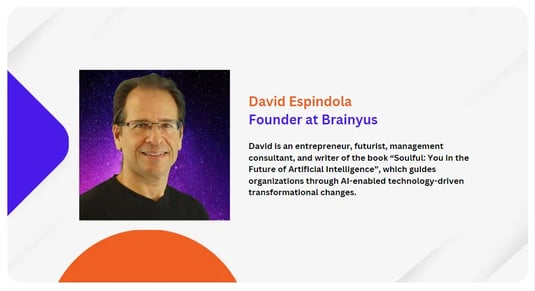
Addressing the query, David shared an excerpt from his book ‘Soulful: You in the Future of Artificial Intelligence':
“The future will require people with the ability to solve wicked problems that are complex, constantly changing, and for which there are no prescribed formulas. In a complex, interconnected, and fast-changing world, we need to develop a workforce that is proficient at lateral thinking—the ability to search for input from multiple domains and connect the dots in unique ways to gain new insights. Tasks that are restrained and repetitive are more likely to be automated. To compete and collaborate with machines, humans must use conceptual reasoning skills to connect new ideas across contexts and apply conceptual knowledge from one problem domain to an entirely new one.
Management will have to take these considerations into account as it plans for organizational development. Hiring processes may have to evolve from seeking candidates that can fill specific roles based on specialized knowledge and experience to a less restrictive practice where companies seek to hire people that can demonstrate the ability to fill multiple roles yet to be defined. Diverse experiences may become more valuable than specialized knowledge. Training programs will have to adapt so that people can be given the opportunity to be exposed to a broad set of principles and experiences.
AI will be able to enhance the talent acquisition process by evaluating not only a candidate's hard skills but also the more nuanced soft skills that may be difficult to detect in an interview process. However, the human in the loop will be essential to evaluate AI's recommendations and make the ultimate decision about who to hire. Talent acquisition budgets will likely increase in the short term due to the need to implement emerging technologies such as AI. However, an increase in efficiency will likely offset these costs in the long run.”
15. Phil Strazzulla, Founder at SelectSoftware
How do you think the increased use of AI will affect talent acquisition, and which acquisition aspect will reap the most benefits from AI?
The increased use of AI will significantly streamline talent acquisition activities, right from sourcing, screening, interviews, checks, offers, and onboarding. It will first and foremost save time and money, but to be more granular, it will help talent acquisition leaders and managers to effectively screen and hire the right talent. I think sourcing new talent will be greatly impacted in a positive way as leaders will have the right data and will be able to target very specifically. Right from job changes to side hustles, hiring managers can identify the right information about the candidates they are targeting with the help of AI. Another way AI can help a lot is with drafting job descriptions, legal documents, questions for interviews, etc.
Would you trust AI with hard-to-measure metrics like employee experience, well-being, inclusion, etc.?
We need to give the systems some time before we can completely trust the data that's coming out of them. If everything is set in the right way, the data will most probably be right. However, it will require time and effort initially.
With technological advances, do you expect the talent acquisition budget to increase or decrease in the future?
I expect the budget to decrease or be spent in different ways as sourcing and hiring talent will become easier and cheaper. This is when the extra budget can be spent on people operations activities focusing on making the workplace a better place to be in and, more importantly, increasing retention.


